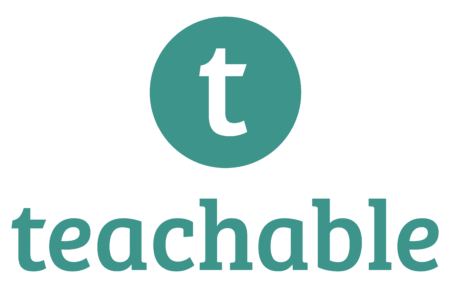A new phase in education has been initiated by the digital revolution, characterized by the increasing appeal of online learning platforms. These platforms serve as key agents in democratizing education, offering learners from all corners of the globe the ability to access a rich repository of knowledge and skills at their leisure. Against the backdrop of this educational evolution, Teachable has established itself as a major contributor, imparting unique value to both teachers and learners.
Teachable has established a distinctive presence in the digital education landscape, prioritizing the empowerment of creators. This platform facilitates the creation, management, and sale of online courses and coaching services for individuals and businesses effortlessly. Teachable stands out for its user-friendly interface, a comprehensive set of tools for course creation and sales, and a commitment to helping creators succeed. With the growing need for flexible and accessible learning options, Teachable’s platform becomes increasingly vital in enabling the transfer of knowledge and skills, narrowing the divide between experts and eager learners.

For those looking for a video based review, here is anoverview video of Teachable from the YouTube channel Nurturing By Marcus. However, if you want a more in-depth review, you can also read the whole article below.
Teachable Overview Does Teachable Market My Course
Key Features and Benefits
Teachable is celebrated for its extensive array of functionalities that simplify the course development process, appealing to both educators and business-minded individuals. Principal features involve a user-friendly course builder accommodating a broad spectrum of multimedia content, integrated payment processing for effortless transactions, and customizable course pages, permitting creators to synchronize their digital classrooms with their branding. Moreover, Teachable supplies advanced analytics tools to gauge student engagement and performance, helping creators enhance their courses for superior outcomes. The platform also simplifies the management of student interactions through built-in tools for quizzes, discussions, and feedback, enhancing the learning experience.
Target Audience and Ideal Use Cases
The target demographic for Teachable encompasses a diverse group of content producers, from solo teachers and field experts to small companies and large entities seeking to furnish professional growth paths. Teachable is apt for a variety of uses, from hobbyists disseminating their expertise in arts and crafts to professionals bestowing certifications in digital marketing. Teachable is particularly well-suited for creators looking for a dedicated platform to build and grow their online education business, offering them the flexibility to scale their offerings from a single course to a full-fledged online academy. Whether for augmenting income, establishing a personal brand, or enlarging an educational business, Teachable offers a flexible and accessible setting to satisfy various e-learning requirements.

>>Click Here to Try Teachable for FREE <<
Teachable vs. Kajabi
Kajabi presents itself as an all-in-one platform that goes beyond course creation to include marketing, sales, and business management tools. It caters to entrepreneurs and creators aiming not just to teach but also to establish a full-fledged online business. Key features of Kajabi encompass sophisticated course creation tools, automated marketing campaigns, sales funnel construction capabilities, and broad branding customization options. Kajabi is aimed at creators seeking a solid system to handle every component of their online course business, including content delivery and customer relationship management. Does Teachable Market My Course
Comparison of Teachable and Kajabi
- Course Creation Tools: Both Teachable and Kajabi offer powerful course creation capabilities, but Kajabi provides more advanced features for interactivity and engagement within its courses. Teachable, on the other hand, focuses on simplicity and ease of use, making it more accessible for first-time course creators.
- Marketing Capabilities: Kajabi excels with its built-in marketing tools, including email marketing and sales funnels, designed to automate and optimize the sales process. Teachable offers basic marketing tools but lacks the depth of automation and integration found in Kajabi, making Kajabi the better choice for creators with extensive marketing needs.
- Pricing Options: Teachable allows for a lower-cost entry with its no-charge plan, subject to transaction fees, and its higher-tier plans are usually less costly than Kajabi’s. The pricing strategy of Kajabi, reflecting its wide array of features, positions it as a premium service.
- Ease of Use: Teachable gains recognition for its straightforward interface, facilitating an easy course creation and management process for users. Kajabi, also accessible, requires a bit more acclimation due to its broader range of features and capabilities.
Pros and Cons of Teachable over Kajabi
Pros of Teachable:
- With a pricing model geared towards affordability, it opens up opportunities for a more diverse group of creators.
- The platform stands out for its straightforwardness and ease of navigation, making it an ideal choice for beginners and those who prefer a no-frills approach to course development.
- It is dedicated to the aspects of course production and student involvement, possessing enough capabilities to fulfill the demands of numerous course creators.
Cons of Teachable:
- Limited marketing and sales tools compared to Kajabi, potentially requiring additional third-party tools for advanced marketing strategies.
- The platform offers fewer customization and automation capabilities, which could affect creators aiming to expand their business substantially.

>>Click Here to Try Teachable for FREE <<
Teachable vs. Udemy
Udemy is based on a marketplace concept, identifying as a wide-ranging online learning space where educators worldwide can craft and vend courses to an extensive audience of students. Its foremost advantage rests in its wide-reaching audience, affording instructors a built-in base of learners. This framework ensures course visibility across numerous topics, making it an appealing alternative for educators looking to engage a large market with scant marketing actions.
Differences between Teachable and Udemy
- Governance of Course Content: Teachable empower instructors with complete control over their course’s content, its pricing, and data on students. In contrast, Udemy manages how courses are priced and often employs significant discounts to appeal to students, potentially impacting instructors’ revenue and their course’s market positioning.
- Profit Structures: Teachable permits course creators to maintain a greater fraction of their sales, especially in its more advanced plans, in exchange for a monthly platform fee, thus ensuring a higher potential for earnings per sale. Meanwhile, Udemy employs a revenue split model, providing instructors with a share of each sale, which differs based on the student’s course discovery method. Does Teachable Market My Course
- Self-Marketing Capabilities: Teachable furnishes creators with resources for self-marketing, including email campaigns and affiliate partnerships, facilitating brand development. Conversely, Udemy’s approach leans heavily on its internal marketing mechanisms, restricting instructors’ direct control over sales and the growth of a personal student community.
Advantages and Limitations of Teachable vs. Udemy
Advantages of Teachable:
- Greater control over course content and pricing, allowing educators to set their course value.
- Higher revenue potential per sale, with transparent pricing models and lower transaction fees.
- Educators can establish direct relationships with their students, thanks to more independence in marketing and branding.
Limitations of Teachable:
- Educators need to independently gather their student base, without the immediate access to a marketplace’s built-in audience.
- Especially for newcomers, the monthly fees required for platform access could be a significant hurdle.

>>Click Here to Try Teachable for FREE <<
Teachable vs. Podia
Podia is acclaimed for its direct and easy-to-navigate method for offering online courses, digital products, and memberships. Emphasizing simplicity and a direct-to-consumer model, Podia enables creators to quickly launch their products without navigating complex features or setups. This platform is favored by those who seek ease of use and desire to focus on the creative and selling process, without the hassle of technical intricacies.
Comparison of Teachable and Podia
Interface and Accessibility: Teachable and Podia both feature user-friendly interfaces that simplify the course creation process. Podia, however, is noted for its especially streamlined interface, offering greater ease for novices. Teachable provides comprehensive customization features, which, while beneficial, may necessitate a longer learning period.
Marketing Features: Teachable offers a broader spectrum of marketing tools, including affiliate programs, email marketing, and discount coupons, surpassing Podia’s simpler marketing features. Podia, maintaining its design philosophy, offers essential marketing tools but with less complexity, making it straightforward but less feature-rich. Does Teachable Market My Course
Pricing Strategies: Teachable and Podia both offer structured pricing tiers, with Podia standing out by not charging transaction fees for any of its plans, a boon for creators in the early phases of selling. Teachable’s initial plans come with transaction fees, though it enhances its more premium plans with a greater breadth of features.
Pros and Cons Teachable Over Podia
Benefits of Choosing Teachable:
- Creators in need of advanced customization options and a comprehensive platform for scaling their online course business may find Teachable to be a more fitting solution.
- Teachable’s extensive marketing toolkit enables more strategies for course advertising and engaging with students.
- The advanced analytics and reporting functions of Teachable provide creators with in-depth views into their course effectiveness and student interactions, supporting strategic planning.
Drawbacks of Choosing Teachable:
- The platform’s structure and additional features come with a steeper learning curve compared to Podia’s straightforward setup.
- For new creators beginning to market their courses, Teachable’s transaction fees on its basic plans may diminish their overall revenue.

>>Click Here to Try Teachable for FREE <<
Teachable vs. Kartra
Kartra is recognized as a complete marketing platform that addresses the varied needs of online businesses, from course hosting to digital marketing and entrepreneurship. It unifies course hosting, email marketing, sales funnel creation, and CRM into a singular platform, positioning itself as a formidable resource for individuals seeking to manage all aspects of their online business in one place. This approach aims to streamline operations, enhance marketing efforts, and improve sales conversions through advanced automation and analytics.
Analysis Teachable vs Kartra
- Course Creation: Teachable specializes in course creation, offering an intuitive interface, multimedia support, and student engagement tools like quizzes and certificates. Kartra, while capable of hosting courses, emphasizes its marketing and sales tools, making its course creation features more secondary.
- Marketing Automation and Funnel Capabilities: Kartra excels with its in-depth marketing automation tools, facilitating the creation of detailed sales funnels, automated email sequences, and targeted marketing strategies. Teachable offers elementary marketing features, lacking the elaborate automation and funnel architecture that Kartra provides.
- Usability of the Platform: Teachable is celebrated for its simplicity and user-friendly approach, catering to educators and creators who may not have extensive technical expertise. Kartra, with its wide array of features, presents a steeper learning curve, targeting users with a background in digital marketing or those prepared to dedicate time to learn the system.
Pros and Cons of Teachable vs Kartra
Pros of Choosing Teachable:
- Simplicity and Focus on Education: Teachable’s platform is straightforward, focusing primarily on the educational aspect of course creation and student management, making it ideal for educators.
- Streamlined User Experience: Teachable provides a straightforward interface, allowing for quick course development and launch, mitigating the intricacies of online course oversight.
- Enhanced Educational Resources: Teachable provides focused educational tools, such as quizzes, certificates of completion, and mechanisms for student feedback, to elevate the learning experience.
Cons of Choosing Teachable:
- Restricted Marketing Capabilities: Teachable’s marketing and sales funnel functionalities are less developed than those offered by Kartra, potentially leading to the adoption of additional platforms for implementing advanced marketing plans.
- Limited Business Management Tools: Teachable centers its functionalities around course creation and management, not providing the broad array of business tools found in Kartra for overseeing various facets of an online enterprise.

>>Click Here to Try Teachable for FREE <<
Conclusion Does Teachable Market My Course
When contrasted with Kajabi, Udemy, Podia, and Kartra, Teachable stands out for its user-friendliness and focus on education, making it the go-to for creating courses easily and keeping students engaged. Your selection should match your aims: Teachable for ease and education, Kajabi or Kartra for all-encompassing online business resources, Udemy for maximum exposure without the need for marketing, and Podia for a middle ground of ease and marketing effectiveness.
Teachable keeps a solid stance in the online course platform sector, celebrated for its straightforward usability and concentration on effective educational experiences. Teachable presents a functional approach for educators to emphasize content presentation and interaction with students. With the expansion of e-learning, Teachable’s commitment to enhancing educational access and involvement establishes it as a significant contender among content producers and students.
